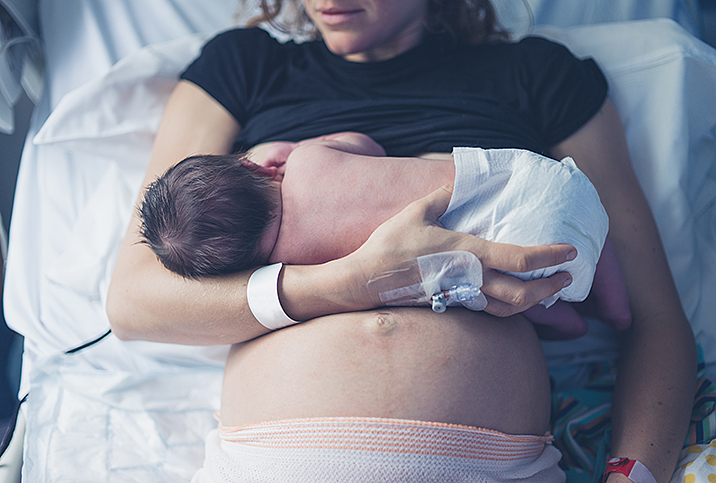Never Wake a Sleeping Baby (or Should You?)

Many new parents are excited to bring their newborn babies home. At the same time, the prospect of round-the-clock feeding leaves many of them equally terrified. They may be unsure whether to feed a baby every hour, every couple of hours or on demand.
We've all heard the common adage "Never wake a sleeping baby." But that's easier said than done when stressing about your newborn's eating habits. The simplest advice is this: Feed the baby when they're hungry—and they will let you know when they are, according to the American Academy of Pediatrics.
Generally, you only need to routinely wake a baby for feedings until they regain their birth weight, according to Krystyn Parks, R.D., I.B.C.L.C., a pediatric dietitian in Orange County, California.
"Most babies lose weight in the first few days of life but will regain their birth weight by two weeks. If there are no other health concerns, at this point you can usually stop waking baby for feeds," she explained.
Normally, crying and other hunger cues are the key signals to look out for when a baby is hungry. It's important for new parents to watch out for little tells or gestures that can alert them to whether their baby is hungry well before the crying begins, according to Chrisie Rosenthal, mom of two and an international board-certified lactation consultant at the Lactation Network in Chicago.
"Newborns can be very sleepy, and you need to ensure that they get a minimum of eight to 12 feeds every 24 hours," Rosenthal advised. "In the first couple weeks, that means you need to feed your baby a minimum of every two-and-a-half to three hours, measured by start of one feed to start of the next feed, and when your baby shows hunger cues."
These hunger cues can include:
- General fussiness or irritability
- Rooting against a parent's chest with his or her jaw, mouth or head, seeking to suckle
- Rapid opening and closing of the mouth
- Repeatedly putting a hand to their mouth
- Licking of lips or just sticking their tongue out
- Sucking on the nearest object to their lips
However, if your child was born prematurely or with a medical condition, your pediatrician or neonatal specialist may recommend a feeding schedule to help boost the child's health.
Babies are almost always hungry
If your newborn is always hungry, that's pretty normal, Parks said.
"Babies grow a lot in their first year of life. They will usually double their weight in the first six months. Because they do so much growing and their stomachs are small, they have to eat often," Parks said. "This is true with breastfeeding and formula feeding. There will be certain times where it will feel that your baby is eating nonstop."
Rosenthal swears by a baby feeding schedule that has helped her with her two children. According to her, a schedule generally works when the baby is between 2 and 4 four months of age, when feeding and sleeping habits become more consistent and predictable.
- Newborns to 2 weeks old. They need to eat every three or four hours, essentially eight to 12 times a day. Afterward, they increase their intake to around 1 to 2 ounces per feeding. The amount rises to 2 to 3 ounces per feeding by the time the child is 2 weeks old.
- Two months. Babies start taking up to 5 ounces per feeding and need feeding every four hours.
- Six months. Six-month-old babies drink a full cup (8 ounces) every five hours and eventually level off at around 7 to 8 ounces. At this point, pediatricians recommend starting the baby on solid foods.
Rosenthal added that it's also important to take care of yourself. Periods of increased feeding can be exhausting for parents. She recommends having a support network.
"These are the times to ask for help, she said. "Having someone run an errand for you or hold the baby so you can take a nap will go a long way to getting you through those hungry baby days. If you have a partner at home, try to trade off time to nap in the day so you'll both be a little more rested for the nights."
How to know if your baby is eating enough
A couple of indicators let parents know if their children are eating enough for their age and weight. These are:
- The number of dirty diapers in a day. This is especially true in the case of newborns and premature babies. In the first two or three days after birth, an infant should have two to three wet diapers per day. After that, if the child is feeding properly, the number increases to at least five or six wet diapers daily.
- Progress on the child's growth chart. Weighing and measuring babies is part of the standard pediatric examination, and the figures are plotted on the child's growth chart. This is one of the easier indicators to understand: Children whose weight and height are well within the standard growth percentile ranges are getting the proper amount of food whenever they feed.
Weighing your baby
Babies tend to lose a bit of their birth weight during the first two weeks of life as their digestive systems adjust to food, according to the American Pregnancy Association.
Afterward, a baby's weighing schedule should be as follows:
- Once a month up until the sixth month of life
- Once every two months between the ages of 6 and 12 months
- Once every three months after their first birthday
For Parks, however, just weighing at the doctor's visits is enough. She says some parents buy infant scales to track their baby's growth at home, but it usually isn't necessary.
"While we talk about growth goals as if growth is linear, babies tend to grow in spurts. This means that they won't necessarily gain the same amount of weight every day," she explained.
The weight gain may be more or less each day, and that usually doesn't indicate a problem. Weighing babies frequently can lead to additional, unnecessary stress, if there are no health concerns with the baby.
If you are concerned that your baby isn't getting enough to eat and you want to weigh them more often, be sure to reach out to a lactation consultant or pediatrician. They can help you evaluate whether there is a weight or milk supply issue, create a plan, and possibly discuss additional weighings at home using an infant scale.
















